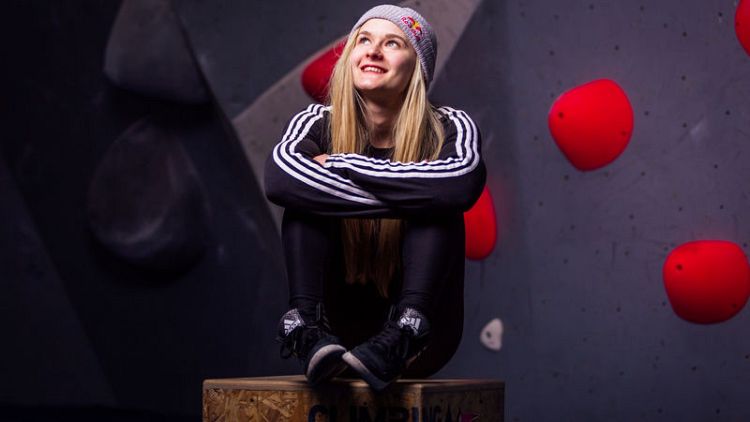By Martyn Herman
LONDON (Reuters) - For an athlete with her sights set on competing at next year's Tokyo Olympics, Britain's Shauna Coxsey spends an awful lot of her time simply hanging around. She is good at it too.
The 26-year-old is a two-times World Cup winner in the competition climbing discipline of bouldering -- a sport requiring dexterity bordering on contortionism, strength, a penchant for puzzle-solving and iron fingers.
To get her digits into shape, Coxsey uses the 'Beastmaker' -- a wooden block containing a variety of holds, from which she dangles during training sessions, defying gravity with the tips of her fingertips, often with 40kg strapped to her back.
"I do it about three times each week, just hang for as long as I can, and it could be just a quarter of my fingertips," the 26-year-old told Reuters at the brand new University of Warwick climbing wall recently.
"I hang my weight (57 kg) plus 47 kilos added, sometimes on a hold which is just 8mm deep. I think my maximum pull-up was 50 kg, just for a novelty!"
Bouldering is one of three disciplines that will form a combined medal event when climbing makes its Olympic debut next year, the others being speed and lead.
It looks less intimidating than scaling a craggy rock face, or even the 15m high climbing wall at Warwick.
A bouldering course is typically no higher than four metres and is adorned with what look like huge chunks of irregularly-shaped colour-coded candy, on which a climber, without ropes, must pick a path to the top.
That often involves a move called a dyno where Coxsey leaps from hold to hold with the sort of gravity-defying agility with which Spider-Man himself might struggle.
MENTAL WORKOUT
No matter that Coxsey can perform one-armed pull-ups for fun, she says bouldering is just as much a mental workout as a physical one -- a three-dimensional algebraic boot camp.
With no two bouldering layouts ever identical, Coxsey and her fellow competitors have just five minutes to visualise the layout, then scale the wall. They get one chance.
"We call them boulder problems because it's as much mental as physical, you really have to solve them, and when there is that time pressure on top, that really fascinates me," Coxsey, who won the 2016 and 2017 Bouldering World Cups, said.
"Route setters set the climb to be done a certain way but sometimes you can find a different way. I'm very much obsessed with the creative element of the sport, the fact you are so free, no ropes and no harnesses."
Coxsey's passion for climbing began as a four-year-old when she watched a film about French free climber Catherine Destivelle. Five years later she won her first national title.
At 18 she was poised to study sports science at university, but deferred her offer to concentrate on climbing.
A few months later she broke her leg but says it was a "blessing in disguise" as it gave her three months to concentrate on improving her finger strength.
"I was sat at home watching the Olympics and thinking I want to be an athlete, not just a climber."
LEARNING NEW SKILLS
After her second World Cup win in 2017 she suffered a serious finger injury. "I ripped a pully tendon in my right hand. It made quite a good noise really, a nice pop," she says.
Coxsey was critical when the IOC announced that climbing would be added to the Tokyo programme -- saying the three-format event was rather contrived.
Since then, however, she has warmed to the task of learning new skills, specifically speed climbing -- an event which sees athletes literally sprint up a 15m high wall.
The women's record is currently 7.101 seconds.
"I didn't agree (with the Olympic format) at first because it's a hybrid event," she said. "Now I totally understand it.
"I think our sport should be showcased as a combined so you can see all three disciplines."
While bouldering and speed climbing require explosive movements and power, lead climbing is more akin to mountain climbing with athletes, attached to the wall with ropes, attempting to reach as high as possible without falling off.
"It's a real challenge she said but after 20 years in the sport it's great try to learn a new skill," she said.
"Imagine Usain Bolt being asked to run a 100m race then going to do a trail run through the forest with no map."
Coxsey insists climbing is as natural for humans as walking and still finds it "surreal" that her lifelong passion could lead her to the Olympics next year.
It means, for the time being, she will more likely be found on a man-made climbing wall than her local Peak District crags.
"The rocks aren't going anywhere but the Olympics is just once every four years," she said.
(Reporting by Martyn Herman; Editing by Toby Davis)












